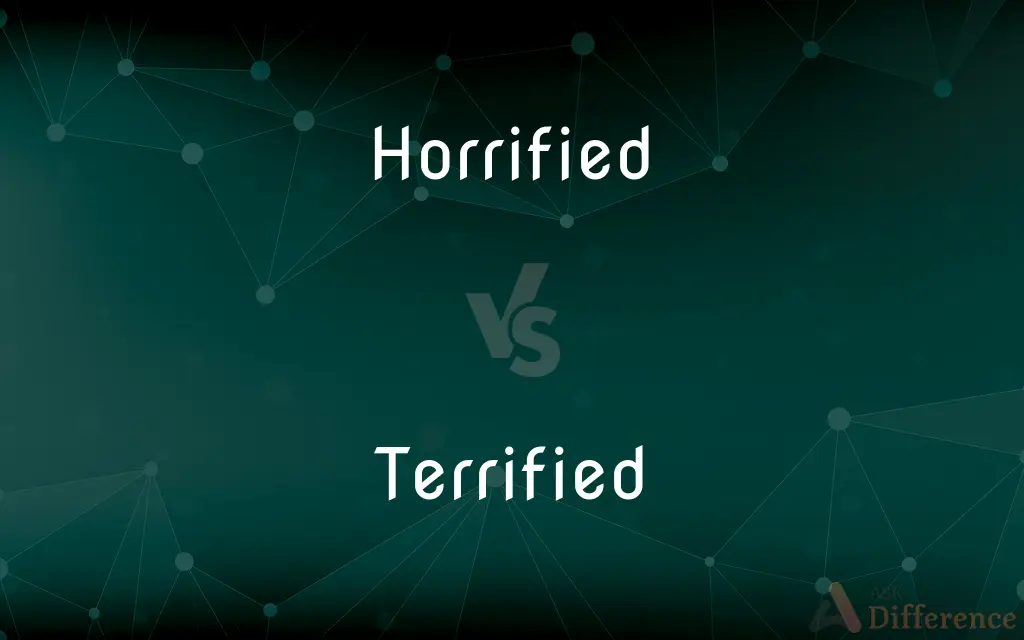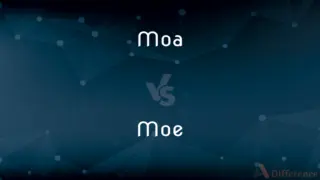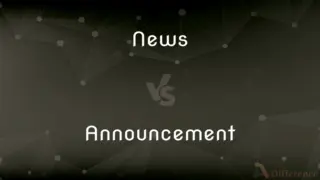Horrified vs. Terrified — What's the Difference?
By Maham Liaqat & Fiza Rafique — Updated on May 7, 2024
Horrified means experiencing intense shock and disgust, often from witnessing something disturbing, while terrified refers to a state of extreme fear or panic. Both denote strong emotional reactions but arise from different stimuli.

Difference Between Horrified and Terrified
Table of Contents
ADVERTISEMENT
Key Differences
Horrified describes a feeling of extreme shock and disgust, often in reaction to gruesome or morally offensive scenes. Terrified, on the other hand, indicates intense fear, usually in response to perceived physical danger or threats.
Horrified often involves revulsion, like when witnessing a gruesome accident or learning about a heinous crime. Terrified implies a strong feeling of dread, like when facing a threatening situation, such as being chased.
Horrified reactions typically focus on moral or visual offensiveness, sometimes leading to outrage. Meanwhile, terrified responses are rooted in fear for one's own safety or well-being, causing heightened anxiety.
Horrified is a reaction that can stem from witnessing or learning about disturbing events that evoke moral indignation. Terrified reactions stem from immediate or imminent threats that create an urgent need to escape.
Comparison Chart
Emotional Focus
Shock, disgust
Intense fear, panic
ADVERTISEMENT
Common Trigger
Gruesome, disturbing, immoral situations
Perceived physical danger
Response Nature
Outrage, revulsion
Urgency, desire to escape
Duration
Can be lasting due to moral implications
Often immediate but short-term
Severity Level
Less immediate but emotionally impactful
More urgent, directly linked to fear
Compare with Definitions
Horrified
Feeling intense shock or disgust.
She was horrified by the news of the catastrophic accident.
Terrified
Feeling extreme fear or panic.
The loud noise left him terrified of another explosion.
Horrified
Witnessing something gruesome or offensive.
He was horrified to find animal cruelty in the neighborhood.
Terrified
Experiencing panic due to a phobia.
He was terrified of spiders since childhood.
Horrified
Stunned by discovering something deeply unpleasant.
She was horrified to see her work had been deleted.
Terrified
Facing imminent physical danger.
They were terrified when the robber broke in.
Horrified
Evoking moral outrage.
They were horrified by the inhumane conditions in the factory.
Terrified
Frightened by a disturbing presence or situation.
She was terrified when she realized she was being followed.
Horrified
Being in disbelief due to the severity of a situation.
I was horrified at how recklessly they drove.
Terrified
Reacting to a sudden, frightening event.
I was terrified when the earthquake shook the building.
Horrified
Horrified is the only full-length studio album by American grindcore band Repulsion. This album was influential on later goregrind bands.
Terrified
To fill with terror; make deeply afraid
"She was terrified that he would lie to her" (Jodi Picoult).
Horrified
To cause to feel horror
The citizens were horrified by the bombings. The guest was horrified at the rudeness of what he had said.
Terrified
To drive or force by arousing fear
"The few who survived had long ago been terrified into complete intellectual surrender" (George Orwell).
Horrified
To cause unpleasant surprise to; shock
"I ... passed a mirror ... &.
Was horrified at the shabbiness of my hat" (Margaret Suckley).
Terrified
Extremely frightened.
Horrified
Struck with horror.
Terrified
Simple past tense and past participle of terrify
Horrified
Simple past tense and past participle of horrify
Terrified
Thrown into a state of intense fear or desperation;
Became panicky as the snow deepened
Felt panicked before each exam
Trying to keep back the panic-stricken crowd
The terrified horse bolted
Horrified
Stricken with horror
Common Curiosities
Can "horrified" be used for extreme fear?
"Horrified" is typically more associated with disgust or moral outrage than fear.
Is "terrified" always related to a physical threat?
Not always; it can also describe deep phobias or psychological fears.
Can a person be horrified and terrified simultaneously?
Yes, it's possible when an event evokes both shock/disgust and intense fear.
Are "horrified" and "terrified" formal or casual terms?
Both are commonly used in both formal and casual contexts.
Do "horrified" and "terrified" share any synonyms?
Both share some overlapping synonyms like "appalled," but each has distinct ones too, like "repulsed" for horrified and "petrified" for terrified.
Can "terrified" describe fictional or imaginary threats?
Absolutely, as fear can arise from imagined dangers, especially in horror literature or media.
Do "horrified" and "terrified" imply lasting emotions?
"Horrified" can linger due to moral implications, while "terrified" is usually more immediate and short-lived.
Can "horrified" and "terrified" describe collective emotions?
Yes, both can refer to the shared emotions of a group, such as people being horrified by an atrocity or terrified during a disaster.
Is "terrified" used figuratively as well as literally?
Yes, "terrified" can be used figuratively, as in "terrified of failure," to express intense anxiety.
Is "horrified" used more in response to news or information?
Often, yes, it is used when people react to disturbing information about events or behaviors.
How do "horrified" and "terrified" influence behavior?
"Horrified" can lead to withdrawal or confrontation due to moral outrage, while "terrified" often results in attempts to escape or hide.
Can "horrified" refer to a mild shock or surprise?
No, "horrified" usually indicates a strong reaction involving disgust or deep shock.
Can "terrified" describe extreme discomfort rather than fear?
No, "terrified" specifically denotes strong fear or dread, not mere discomfort.
Do these terms vary in intensity compared to synonyms?
Yes, synonyms like "scared" or "shocked" are less intense than "terrified" and "horrified."
Is "horrified" typically associated with visuals, like "terrified"?
Yes, "horrified" often relates to something seen or heard but more frequently to a morally distressing context.
Share Your Discovery

Previous Comparison
Moa vs. Moe
Next Comparison
News vs. AnnouncementAuthor Spotlight
Written by
Maham LiaqatCo-written by
Fiza RafiqueFiza Rafique is a skilled content writer at AskDifference.com, where she meticulously refines and enhances written pieces. Drawing from her vast editorial expertise, Fiza ensures clarity, accuracy, and precision in every article. Passionate about language, she continually seeks to elevate the quality of content for readers worldwide.
















































